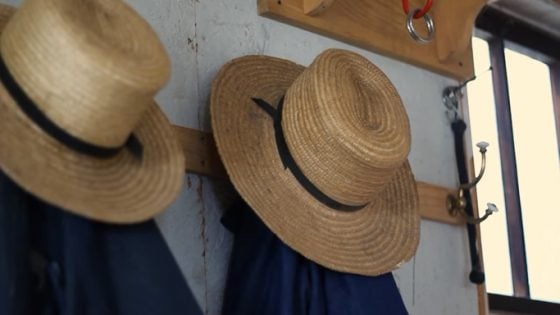“Facebook on Paper”: A Closer Look at The Budget Newspaper
The Budget, published in Sugarcreek, Ohio since 1890, is a correspondence paper popular in Amish and Mennonite communities. This is one of the best articles I’ve seen on the paper, a fairly deep dive into how the Budget gets made, who reads it, what it covers, and more, by Sophie LeMay of thereportingproject.org.
The intro:
SUGARCREEK, Ohio – Of all print newspapers in the U.S., The Budget could be around the longest.
At 60 pages and about 20,000 copies a week, it’s one of the largest paid-circulation weekly newspapers in the country. It has no online edition. Paper only.
What’s its secret to success at a time when most newspapers are losing print circulation?
Its loyal readership: Amish and Mennonite people. The Budget is a staple on the kitchen tables of these conservative Anabaptists around the world. For some, without the use of social media, smartphones, and automated travel, the paper is a primary source of information.

And some of the more interesting bits. This is one of the most succinct descriptions I’ve seen of what The Budget provides:
Dan Raber considers The Budget a way for a lot of people “to keep a light touch on what’s happening with extended family without making phone calls or writing letters.
“It’s a way of having a wider connection without feeling personally obliged to step into somebody else’s space,” says Raber, owner of The Colonial Homestead hand-tool and woodworking shop on Rt. 241 between Millersburg and Mt. Hope, and the son of a Budget scribe.
Milo Miller, publisher of the Budget, and his team do have to do some editorial work as far as content of letters sent in by their 700-some scribes:
While the newspaper’s content typically remains benign, it’s not without effort by the editors, who know their audience well. Milo Miller, whose father grew up Amish, was not raised within the Amish or Mennonite church, but he lives in the area and is keenly in tune with his readers.
The newspaper is owned and operated by people outside of the “plain” community. Miller says the staff is mindful of this dynamic, and they work hard to show respect to the community they serve. “It’s not our paper; it’s theirs,” he says.
Amish and Mennonite scribes produce the content, but Miller and others who aren’t Amish edit the paper ― including sometimes removing controversial content on politics, sex, violence, drugs, and alcohol.

And a funny bit about how Pennsylvania Dutch doesn’t always ease itself into English translation:
“Only in The Budget can you read, ‘She is on a wheelchair going backwards,’ in a letter about someone’s health, or ‘The yard sat full of people,’” says Walnut Creek, Ohio, scribe Willis Miller with a laugh. “Pennsylvania Dutch doesn’t always translate” well into English.
A quote from Milo Miller closes the piece – a look to the future in the face of a changing media industry: “I honestly think, and it’s nothing I’ve done, this will be the last newspaper standing.”
Read it all here. You can also check out our 2021 interview with Milo on The Budget.




Very professional
“The Budget” is an amazing weekly newspaper that is better organized than most online publications. At least when I’m looking for a column I’ve read, it doesn’t disappear minutes later. The reporting by local scribes show the cultural and religious interconnectedness when far-flung districts across Amish country have attended the same funerals. “The Budget’s” staff is professional and checks out their prospective advertisers to be sure they are legit and appropriate. You can even reach the staff by telephone and email, and pay your bill with a credit card!
The Budget Newspaper Subscription Info
How do I subscribe to the Budget? Is there an 800 number or do I have to snail mail a request? A trial subscription, if available, would be even better.
Phone number for The Budget
You may call the Budget at 333-852-4634.
Correction on phone number
The correct number for the Budget is 330-852-4634.
Thank you for The Budget article - I also write for/about Amish/Mennonite topics and enjoy learning more about those special folks
Very good look at The Budget. Thanks!
Here is a link to an article I wrote for Homestead.org about The Budget 12 years ago:
https://www.homestead.org/lifestyle/letters-from-the-budget-amish-newspaper/
I am a Quaker, worked for MCC in Africa and have very close Amish and Mennonite friends here in the US. I have written other articles about the Amish for homestead.org
Also you will see my review of Judy Stavisky’s current book, In Plain View, on Amazon and elsewhere.
Barbara Bamberger Scott
Loved this article!
Thanks for sharing this informative article and more insight into The Budget newspaper, scribes and their stories. I’ve been an avid reader of Amish & Mennonite novels for many years and love reading about their lifestyle. A nearby Amish restaurant is one of my favorite places to eat. This article has convinced me to become a new Budget subscriber!